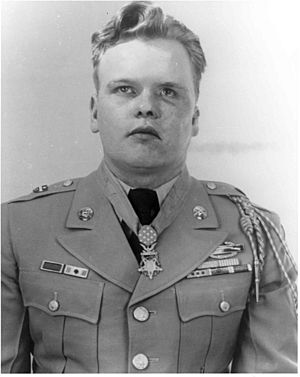Einar H. Ingman Jr. facts for kids
Quick facts for kids
Einar H. Ingman Jr.
|
|
|---|---|

Medal of Honor recipient Einar Ingman
|
|
| Birth name | Einar Harold Ingman Jr. |
| Born | October 6, 1929 Milwaukee, Wisconsin |
| Died | September 9, 2015 (aged 85) Tomahawk, Wisconsin |
| Place of burial |
Oak Hill Cemetery, Skanawan, Wisconsin
|
| Allegiance | United States |
| Service/ |
United States Army |
| Rank | Sergeant |
| Unit | 17th Infantry Regiment, 7th Infantry Division |
| Battles/wars | Korean War |
| Awards | Medal of Honor Purple Heart |
Einar Harold Ingman Jr. (born October 6, 1929 – died September 9, 2015) was a very brave soldier in the United States Army. He earned the highest military award, the Medal of Honor, for his incredible actions during the Korean War. This happened during a major conflict known as the Third Battle of Wonju.
Contents
Serving His Country
Joining the Army
Einar Ingman Jr. was born in Milwaukee, Wisconsin, on October 6, 1929. He grew up on a farm. In November 1948, he joined the Army from Kewaskum, Wisconsin. He hoped to work with large machines. Instead, he became an infantryman, a soldier who fights on foot.
Heroic Actions in Korea
By February 26, 1951, Ingman was a corporal. He was serving in Korea with Company E, 17th Infantry Regiment. This unit was part of the 7th Infantry Division. Near a town called Malta-ri, his group was attacking a strong enemy position. This position was on top of a ridge.
During the attack, both squad leaders were hurt. Corporal Ingman quickly took charge of both groups of soldiers. He called for artillery and tank support. Then, he bravely led his soldiers forward. He encouraged them and told them where to shoot.
Facing Danger Alone
A machine gun was firing at his group. Ingman bravely attacked it by himself. He threw a hand grenade into the machine gun's spot. This stopped the enemy soldiers there. He then used his rifle to finish the job.
As he moved toward a second machine gun, a grenade exploded near him. He was knocked down and lost part of his left ear. When he stood up, an enemy soldier shot him in the face. The bullet went through his upper lip and came out behind his ear.
Even with these serious injuries, he kept going. He continued his attack on the machine gun. He fired his rifle and used his bayonet to defeat the remaining enemy soldiers. Finally, he fell unconscious. His men then captured their goal. They forced the enemy troops to retreat in a rush.
Recovery and Recognition
Ingman was taken to Tokyo, Japan, for medical care. He woke up seven days later. He had lost his left eye and was deaf in his left ear. He also had a serious head injury, which made him forget everything. He couldn't even remember his own name.
After emergency brain surgery, his memories slowly came back. However, he never remembered being shot or what happened right after. He continued to have memory problems for the rest of his life. He spent two years having twenty-three surgeries.
In mid-1951, Ingman was promoted to sergeant. He was flown from the hospital to Washington, D.C.. On July 5, President Harry Truman personally gave him the Medal of Honor. When he returned home to Tomahawk, Wisconsin, the town celebrated his return. They even gave him a new car and a boat!
Life After the War
After leaving the Army, Ingman went back to Tomahawk. He worked for a paper company for 32 years. He started as a security guard and later became a mail clerk. One year after receiving the Medal of Honor, he got married to Mardelle Goodfellow. They had seven children together. Einar and Mardelle often attended government and military events. This included eleven presidential inaugurations and several trips back to Korea.
In 2003, Ingman had a stroke. This affected his speech and how he moved. He lived in Irma, Wisconsin, near Tomahawk. Einar Harold Ingman Jr. passed away in a hospital in Tomahawk on September 9, 2015. He was 85 years old.
See also
 | Tommie Smith |
 | Simone Manuel |
 | Shani Davis |
 | Simone Biles |
 | Alice Coachman |

